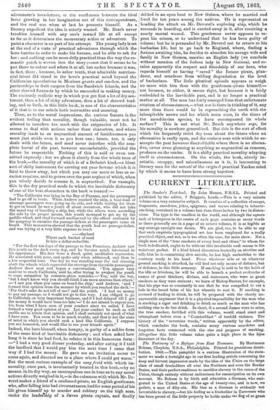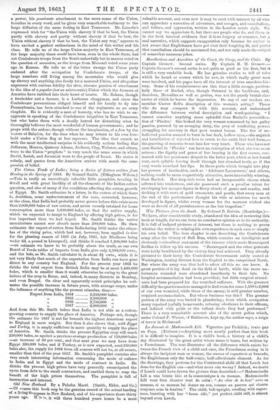The Testimony of a Refugee from East Tennessee. By Herrmann
Bokum, Chaplain, N.S.A., Philadelphia. Printed for gratuitous distri- bution. 1863.—This pamphlet is a curious illustration of the state- ment we made a fortnight ago in our first leading article concerning the deep and fervent impression made by the idea of the Union on the large class of small freeholders all over the Northern and even the Border States, and their perfect readiness to sacrifice slavery in the cause of the Union, though entirely without enthusiasm for emancipation on its own account. Mr. Bokum is by birth and education a German, who emi- grated to the United States at the age of twenty-one, and is now, we gather, a man of fifty-six. His bias as a German is evidently not favourable to slavery,—but his feeling as a freeholder in Tennessee who has been proud of the little property he holds under the flag of so great a power, his passionate attachment to the mere name of the Union, breathes in every word, and he gives very remarkable testimony to the large diffusion of the same feeling in East Tennessee. Mr. Lincoln's expressed wish for "the Union with slavery if that be best, the Union partly with slavery and partly without slavery if that be best, the
Union without slavery if that be best, the Union any way," appears to have excited a perfect enthusiasm in the mind of this writer and his class. He tells us of the large Union majority in East Tennessee, of
the large majority there would have been, even in the whole State, had not Confederate troops from the South unlawfully but in masses voted on the question of secession, as the troops from Missouri voted some years ago in Kansas. He tells us of the bitter wrongs the Union party endured after the occupation by Confederate troops, of the large numbers still living among the mountains who would give up slavery and anything else freely for a restored Union, and altogether expresses with curious fidelity the slow, obscure passion of attachment to the idea of a popular (not an aristocratic) Union which the farmers of America have imbibed into their heart of hearts. Mr. Bokum, though a freeholder and a farmer, is a Lutheran clergyman, and since the Confederate persecutions obliged himself and his family to fly into Pennsylvania, has been attached to one of the regiments as an army chaplain. He is evidently a man of honesty, who has no wish to ex- aggerate in speaking of the Confederate iniquities in East Tennessee, but who hates them with a deadly hatred for disturbing what he thoroughly believes the most wonderful of human governments; and he prays with the ardour, though without the imagination, of a Jew by the waters of Babylon, for the time when he may return to his own free- hold under a Union flag at last supreme. The idea that struck us with the most intellectual surprise is his evidently serious feeling that Jefferson, Monroe, Quincey Adams, Jackson, Clay, Webster, and others, were to the Union "prophets" in very much the same sense in which David, Isaiah, and Jeremiah were to the people of Israel. He states it calmly, and quotes from the American orators with much the same passion of belief.































 Previous page
Previous page